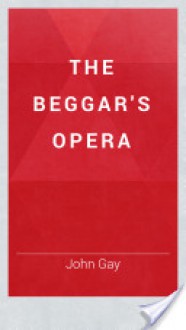
I want to give this play a high score simply because of it's context and content, and as it is one of the only satirical operas that has survived from the early 18th Century should also give this play, or more properly opera, some credit. Now, when we hear the word opera we usually thing of 'it's not over until the fat lady sings' (and then Bart Simpson going 'is she fat enough for you?') and you would actually be quite correct, because that is the type of opera that we would be thinking of in this context. In the early 18th century we see the rise in the popularity of the Italian Opera, which was mostly fat ladies singing, and dealt with heroes, villains, and mythical stories. They were basically the Hollywood blockbusters of the era.
So, along comes John Gay with an idea (which he apparently stole off of Jonathon Swift, of Gulliver's Travels fame) of making a satire of the ever popular opera. So instead of having heroes and mythical scenes, and stories dominated by the rich and powerful he instead delved into the dark and dirty streets of inner London to take us for a satirical journey through the criminal underworld. The problem is that on the page much of the satire does not actually come out, and further, since we are not familiar with the songs (though I am sure we will be familiar with the tunes) the parodying of the operatic style does not evidently come about (and while I have seen a couple of musicals – five to be exact – I have never seen an opera).
The other interesting thing that came out with this play, or at least the commentary, is how much London has changed since these days. Take for instance this place:
or this place:
which for those of us who know London know that these days is a very fashionable area, and also a very expensive place to set up residency. However, back in the days of the Beggar's Opera, this could not be farther from the truth. In fact the area around central London was a crime ridden cesspool that would result in you risking your life if you even considered wondering about after dark (or even not so much after dark). This, however, was almost three hundred years ago, so it is not surprising that London has cleaned up its act a lot, with the rise of the middle-class (as well as the establishment of John Wesley's church, whose mission was targeting the lower class residents of this area at the time).
Another thing that comes about, which I knew about anyway, but this play emphasised it so much more, is the popularity of Gin. Now, I'm a beer drinker, and as such I am generally not that well disposed to spirits, however back in those days spirits were exceedingly cheap. In fact, to some, Gin was the 18th century version of methamphetamine (though it was not illegal). The upper classes simply did not touch it (it was too cheap) and the lower classes would get excessively drunk drinking it. Also, like meth, it would be distilled in basements and apartments, and some of the product that came about was virtually poison.
The other aspect we hear about is the life of the criminal underworld. A bulk of the play takes place in Newgate Prison, and the version that I read had copious amounts of notes explaining a lot of the slang that was used. For instance, unlike today, it actually cost the criminal money to stay at Newgate, and in fact Newgate was one of the most expensive prisons in England in which to be locked up. Obviously nobody had listened to Thomas More when he wrote Utopia because the death penalty was still being imposed at the drop of a hat (though if you could quote a verse from Psalm 21 you could get off because it would suggest that you were literate). They also introduced a system of rewards for various criminals, however this led to the rise of a class known as the thief-catchers who would purposely go out and set people up so they could get the rewards (which would be paid once the thief was hung, in much the same way that rewards are offered by the police on a successful conviction).
It is interesting how there is still this belief that penal penalties (including the death penalty) deter crime, and all we have to do is to look back at this period of English history to know that this does not work. If theft brings about the death penalty, then technically nobody would steal, however a lot of people still stole, and even though it was clear that you would be hung if you were caught stealing, people would still keep on doing it (probably because they either believed that they were too smart to get caught, or they had nothing left to lose). Anyway, this is a whole field of criminology, which I don't really want to go into here because I have written enough already and want to get on and do something else now.

 Log in with Facebook
Log in with Facebook 





